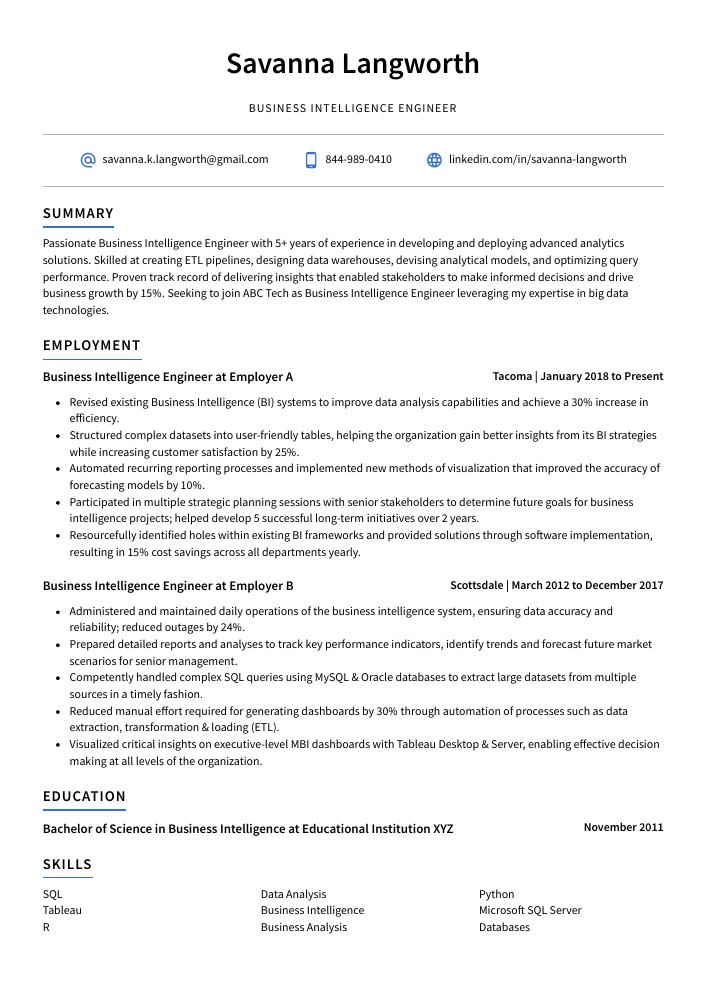Business Intelligence Engineer Resume Guide
Business Intelligence Engineers are responsible for designing and developing data-driven solutions to help organizations make informed decisions. They utilize their technical knowledge of databases, software development, business intelligence tools and analytics to analyze large amounts of data from various sources. In addition, they create reports and dashboards that visualize the insights gleaned from this analysis in order to provide stakeholders with meaningful information about the organization’s performance.
You possess a unique blend of technical and analytical skills that make you an ideal choice for any business intelligence engineering role. To get noticed by recruiters, you must create a resume that highlights your knowledge and experience in the field.
This guide will walk you through the entire process of creating a top-notch resume. We first show you a complete example and then break down what each resume section should look like.
Table of Contents
The guide is divided into sections for your convenience. You can read it from beginning to end or use the table of contents below to jump to a specific part.
Business Intelligence Engineer Resume Sample
Savanna Langworth
Business Intelligence Engineer
savanna.k.langworth@gmail.com
844-989-0410
linkedin.com/in/savanna-langworth
Summary
Passionate Business Intelligence Engineer with 5+ years of experience in developing and deploying advanced analytics solutions. Skilled at creating ETL pipelines, designing data warehouses, devising analytical models, and optimizing query performance. Proven track record of delivering insights that enabled stakeholders to make informed decisions and drive business growth by 15%. Seeking to join ABC Tech as Business Intelligence Engineer leveraging my expertise in big data technologies.
Experience
Business Intelligence Engineer, Employer A
Tacoma, Jan 2018 – Present
- Revised existing Business Intelligence (BI) systems to improve data analysis capabilities and achieve a 30% increase in efficiency.
- Structured complex datasets into user-friendly tables, helping the organization gain better insights from its BI strategies while increasing customer satisfaction by 25%.
- Automated recurring reporting processes and implemented new methods of visualization that improved the accuracy of forecasting models by 10%.
- Participated in multiple strategic planning sessions with senior stakeholders to determine future goals for business intelligence projects; helped develop 5 successful long-term initiatives over 2 years.
- Resourcefully identified holes within existing BI frameworks and provided solutions through software implementation, resulting in 15% cost savings across all departments yearly.
Business Intelligence Engineer, Employer B
Scottsdale, Mar 2012 – Dec 2017
- Administered and maintained daily operations of the business intelligence system, ensuring data accuracy and reliability; reduced outages by 24%.
- Prepared detailed reports and analyses to track key performance indicators, identify trends and forecast future market scenarios for senior management.
- Competently handled complex SQL queries using MySQL & Oracle databases to extract large datasets from multiple sources in a timely fashion.
- Reduced manual effort required for generating dashboards by 30% through automation of processes such as data extraction, transformation & loading (ETL).
- Visualized critical insights on executive-level MBI dashboards with Tableau Desktop & Server, enabling effective decision making at all levels of the organization.
Skills
- SQL
- Data Analysis
- Python
- Tableau
- Business Intelligence
- Microsoft SQL Server
- R
- Business Analysis
- Databases
Education
Bachelor of Science in Business Intelligence
Educational Institution XYZ
Nov 2011
Certifications
Certified Business Intelligence Professional
International Institute of Business Analysis (IIBA
May 2017
1. Summary / Objective
Your resume summary/objective should provide the hiring manager with a snapshot of your skills and experience as a business intelligence engineer. In this section, you can highlight your expertise in data analysis, SQL programming, report generation, and other related tasks. You could also mention any certifications or awards that demonstrate your proficiency in these areas. Additionally, it would be beneficial to include how many years of experience you have working with BI tools such as Tableau or PowerBI.
Below are some resume summary examples:
Professional business intelligence engineer with 4+ years of experience in developing data warehouses, ETL processes and analytical reports. Achieved 10% improvement in accuracy by optimizing existing systems at XYZ Inc., through the implementation of advanced algorithms for data analysis. Experienced working on both relational and non-relational databases. Seeking to join ABC Company to leverage my skillset for creating efficient BI solutions that improve business performance.
Energetic business intelligence engineer with 4+ years of experience in designing and implementing data-driven solutions for businesses. Skilled at gathering, analyzing, interpreting & transforming large datasets to generate actionable insights that drive decision making. Proven track record of developing effective reports and dashboards using BI tools such as PowerBI, Tableau & QlikView. Experienced in SQL programming, ETL processes & database management systems (MySQL).
Determined business intelligence engineer with 5+ years of experience in developing and maintaining data warehouses, ETL pipelines, reporting systems, and analytics solutions. Proven track record of creating solutions that have improved the efficiency of business processes at XYZ Corp. Skilled in database design, optimization techniques, SQL scripting & stored procedures as well as programming languages such as Python & R for statistical analysis.
Skilled business intelligence engineer with 5+ years of experience developing and maintaining data-driven solutions. Proven ability to create efficient, intuitive models that enable organizations to make informed decisions based on insights derived from complex datasets. Seeking a role at ABC Tech where I can utilize my expertise in ETL processes, SQL scripting and analytics software development to help drive strategic business objectives.
Driven business intelligence engineer with 5+ years of experience in data analysis, ETL design and development, reporting automation and analytics. Expertise in MS SQL Server, SSIS/SSRS/SSAS technologies to develop robust business solutions. At XYZ Corporation I developed an automated report system which reduced manual input time by 40%. Experienced at creating custom dashboards for clients using Tableau and Power BI tools.
Committed business intelligence engineer with 5+ years of experience in data analysis, database management and developing BI solutions. Skilled in creating automated dashboards to track KPIs, generate reports and identify trends for decision making. At XYZ Corp designed a cloud-based system which increased accuracy of inventory tracking by 25%. Managed the development of ETL processes for an annual budget savings of $100K.
Enthusiastic business intelligence engineer with 5+ years of experience creating and maintaining data pipelines and developing custom databases. Expertise in manipulating, modeling, analyzing, and visualizing large datasets to extract actionable insights for stakeholders. Looking to join ABC Tech to apply my advanced knowledge of SQL/ETL tools for the benefit of the organization’s analytics initiatives.
Seasoned business intelligence engineer with 8+ years of experience in designing, developing and testing data warehouses. Expertise in ETL processes using SQL Server Integration Services (SSIS). Experienced with various BI tools such as Tableau, PowerBI and QlikView. Proven track record of providing actionable insights to executive teams that have improved business performance by 15-20%.
2. Experience / Employment
Next comes the work history section, which should be written in reverse chronological order. This means your most recent job is listed first.
When writing about what you did, stick to bullet points and provide detail on the tasks you completed and results achieved. You want to make sure that the reader can quickly digest what you have done without having to read through long paragraphs of text.
For example, instead of saying “Developed reports,” say something like “Created custom business intelligence reports using SQL queries, resulting in an increase of 10% accuracy compared with manual reporting methods.”
To write effective bullet points, begin with a strong verb or adverb. Industry specific verbs to use are:
- Analyzed
- Optimized
- Automated
- Visualized
- Forecasted
- Implemented
- Monitored
- Developed
- Designed
- Programmed
- Administered
- Extracted
- Integrated
- Interpreted
- Evaluated
Other general verbs you can use are:
- Achieved
- Advised
- Assessed
- Compiled
- Coordinated
- Demonstrated
- Expedited
- Facilitated
- Formulated
- Improved
- Introduced
- Mentored
- Participated
- Prepared
- Presented
- Reduced
- Reorganized
- Represented
- Revised
- Spearheaded
- Streamlined
- Structured
- Utilized
Below are some example bullet points:
- Implemented data warehouse and business intelligence solutions for an organization of 250+ employees, resulting in improved data accuracy by 30%.
- Improved customer service processes by actively utilizing predictive analytics to identify trends, forecast outcomes and enhance operational efficiencies; reduced response time from 8 hours to 2 hours.
- Actively collaborated with stakeholders to integrate reporting software such as Tableau & Microsoft Power BI into existing IT infrastructures, allowing users to generate interactive dashboards within minutes.
- Integrated best practices in data visualization techniques across multiple departments while creating informative visualizations that increased analytical understanding by 40%.
- Reorganized existing datasets using SQL queries & ETL tools which enabled faster generation of reports; decreased report-processing times from 3 days to 1 day on average.
- Mentored two junior engineers in the development of business intelligence, increasing team productivity by 40%.
- Coordinated with stakeholders to design and implement a comprehensive BI strategy that enabled data-driven decision making; generated $8 million in savings for the company over six months.
- Presented detailed analytics reports on market trends, customer segmentation and competitor insights at quarterly board meetings; developed actionable strategies that increased sales revenue by 22% within one year.
- Developed interactive dashboards utilizing Tableau & PowerBI platforms to visualize complex datasets while adhering to corporate standards and best practices; substantially reduced operation costs by 50%.
- Leveraged SQL queries & APIs to optimize ETL processes across disparate systems resulting in improved data accuracy & loading times of up to 70%.
- Achieved a 10% increase in operational efficiency by utilizing business intelligence (BI) tools and analytics to transform large data sets into meaningful information.
- Represented the organization at various regional BI forums, showcasing new analytical techniques and methods for extracting insights from data sources.
- Interpreted complex datasets through visualizations such as charts, graphs, dashboards etc., enabling executives to comprehend key trends in a concise manner within 15 minutes or less per report.
- Consistently monitored customer behavior across multiple channels and identified opportunities for upselling products; generated an additional $150K in revenue over six months due to early detection of market changes & patterns.
- Analyzed historical sales records using predictive modeling techniques to forecast future demand accurately with 95% accuracy rate compared with industry standards of 90%.
- Forecasted the development of business intelligence models and data visualizations that successfully reduced project costs by 15%.
- Introduced new algorithms to create more accurate analytics, resulting in a 30% increase in the accuracy of predictive modeling over 6 months.
- Monitored SQL queries and optimized them with techniques such as indexing, partitioning & caching; decreased query time from 10 minutes to 2 minutes on average.
- Spearheaded the implementation of an AI-powered system for automated pattern recognition within customer datasets; identified potential trends up to 24 hours sooner than manual methods previously used.
- Successfully designed dashboards and reporting tools using Tableau software which enabled executives to make better decisions based off real-time data insights; improved decision making accuracy by 40%.
- Streamlined data analysis processes by developing complex SQL queries, resulting in a 15% increase in efficiency.
- Utilized advanced business intelligence tools such as Tableau and PowerBI to analyze hundreds of millions of rows of data from multiple sources; identified key trends and insights on customer behavior that drove $8 million worth of profit growth for the company.
- Formulated predictive models based on historical datasets to identify potential areas for expansion into new markets, leading to an additional 40% revenue growth within one year period.
- Demonstrated expertise in designing intuitive dashboards with relevant KPIs (Key Performance Indicators) and visualizations that provided real-time visibility into organizational performance metrics at all levels; achieved over 85% accuracy rate when validating results against actuals from other systems/reports used across departments & teams.
- Reliably monitored database servers, optimized large databases and maintained up-to-date backups while ensuring high availability rates throughout the day (99+%) without any system downtime or outages reported during my tenure as Business Intelligence Engineer.
- Evaluated business performance data from multiple sources to create actionable insights and improved decision-making processes, resulting in a 15% increase in profits over the past year.
- Designed an automated dashboard system for business intelligence reporting, providing real-time updates on customer trends, market forecasts and competitor analysis; reduced manual labor costs by 20%.
- Meticulously maintained up-to-date records of all activities related to BI operations while coordinating with other departments on continuous improvement projects; enabled faster problem resolution timeframes by 40%.
- Expedited daily/weekly/monthly reports creation process through automation scripting for ETL tasks as well as streamlining existing SQL queries; decreased report preparation time by 35 hours per month.
- Compiled detailed dashboards that highlighted key KPIs across different areas of the organization such as marketing campaigns, product launches & sales targets; enabled quick identification of underperforming elements leading to increased efficiency gains worth $10K+ annually.
- Optimized data collection systems by developing and testing new strategies, resulting in an average 80% reduction in data processing time.
- Extracted, analyzed and interpreted complex datasets from multiple sources to inform business decisions; reported findings to management with accuracy and attention to detail.
- Thoroughly investigated customer trends using various BI tools such as Tableau, Qlikview & Microsoft PowerBI while developing reports on root cause analysis for key stakeholders within the organization.
- Facilitated implementation of action plans based on insights gained through analytics; achieved a 10% increase in ROI over 6 months period due to successful execution of these plans.
- Assessed effectiveness of existing analytical models regularly so that they can be adjusted or replaced when necessary; improved performance metrics by 20%.
3. Skills
Even though two organizations are hiring for the same role, the skillset they want an ideal candidate to possess could differ significantly. For instance, one may be on the lookout for an individual with expertise in Tableau and another for someone with knowledge of Microsoft Power BI.
It is essential to tailor the skills section of your resume to each job you are applying for, as this will help ensure that it passes through any applicant tracking systems used by employers. It also provides an opportunity to showcase the most relevant qualifications for a particular role.
In addition, you can further elaborate on these skills throughout other sections such as the summary or experience area – this could be especially beneficial if certain keywords were not mentioned in the initial job posting but still apply to your background/expertise.
Below is a list of common skills & terms:
- Access
- Agile Methodologies
- Amazon Web Services
- Analysis
- Analytics
- Big Data
- Business Analysis
- Business Intelligence
- Business Objects
- Business Process Improvement
- C
- C#
- C++
- CSS
- Data Analysis
- Data Analytics
- Data Mining
- Data Modeling
- Data Visualization
- Data Warehousing
- Database Design
- Databases
- ETL
- Financial Analysis
- Google Analytics
- HTML
- Hadoop
- Hive
- Informatica
- Integration
- Java
- JavaScript
- Linux
- MATLAB
- Machine Learning
- Market Research
- Microsoft Access
- Microsoft SQL Server
- MySQL
- Oracle
- Oracle SQL Developer
- PL/SQL
- Power BI
- Predictive Analytics
- Process Improvement
- Programming
- Python
- QlikView
- R
- Requirements Analysis
- Requirements Gathering
- SAS
- SAS Programming
- SDLC
- SPSS
- SQL
- SQL Server Integration Services
- SQL Server Reporting Services
- SSIS
- SSRS
- SharePoint
- Shell Scripting
- Software Development
- Software Development Life Cycle
- Software Project Management
- Statistical Data Analysis
- Statistics
- T SQL
- Tableau
- Team Leadership
- Team Management
- Teamwork
- Testing
- Time Management
- Unix
- VBA
- Visio
- Visual Basic
- Visual Studio
- Windows
- XML
4. Education
Including an education section on your resume will depend on how far along you are in your career. If you just graduated and have no work experience, mention your education below the objective statement of your resume. However, if you already have a significant amount of relevant work experience to showcase, omitting an education section is perfectly fine as well.
If including an education section, try to include courses or subjects that relate directly to the business intelligence engineer role for which you are applying.
Bachelor of Science in Business Intelligence
Educational Institution XYZ
Nov 2011
5. Certifications
Certifications are a great way to show potential employers that you are knowledgeable and experienced in your field. They demonstrate that you have taken the time to develop yourself professionally, as well as keeping up with industry trends and standards.
If there is an applicable certification for the job you’re applying for, make sure it is included on your resume so hiring managers can see how qualified you are for the position.
Certified Business Intelligence Professional
International Institute of Business Analysis (IIBA
May 2017
6. Contact Info
Your name should be the first thing a reader sees when viewing your resume, so ensure its positioning is prominent. Your phone number should be written in the most commonly used format in your country/city/state, and your email address should be professional.
You can also choose to include a link to your LinkedIn profile, personal website, or other online platforms relevant to your industry.
Finally, name your resume file appropriately to help hiring managers; for Savanna Langworth, this would be Savanna-Langworth-resume.pdf or Savanna-Langworth-resume.docx.
7. Cover Letter
Cover letters are an important part of any job application process. They are a way for you to make yourself stand out from the other applicants and showcase your skills and experience in more detail than what is included on your resume.
Typically, cover letters should consist of 2 to 4 paragraphs that explain why you would be the best fit for the role. It’s also a great opportunity to add some personality by talking about why you’re passionate about pursuing this particular career path.
Below is an example cover letter:
Dear Rebekah,
I am writing to apply for the Business Intelligence Engineer position at XYZ Corporation. With my experience in data mining, analysis, and reporting, as well as my strong technical skills, I am confident that I would be a valuable asset to your team.
In my current role as a Business Intelligence Analyst at ABC Company, I have gained extensive experience in all aspects of business intelligence, from data collection and warehousing to report creation and presentation. I have also developed strong technical skills in SQL, Tableau, and Microsoft Power BI. My ability to effectively collect and analyze data has allowed me to contribute significantly to decision-making at ABC Company.
I am excited about the possibility of bringing my skills and experience to XYZ Corporation. In particular, I believe that my abilities in data mining and analysis would be of great value to your organization. I look forward to discussing how I can be of service to you further during an interview. Thank you for your time and consideration; I look forward to hearing from you soon!
Sincerely,
Savanna
Business Intelligence Engineer Resume Templates
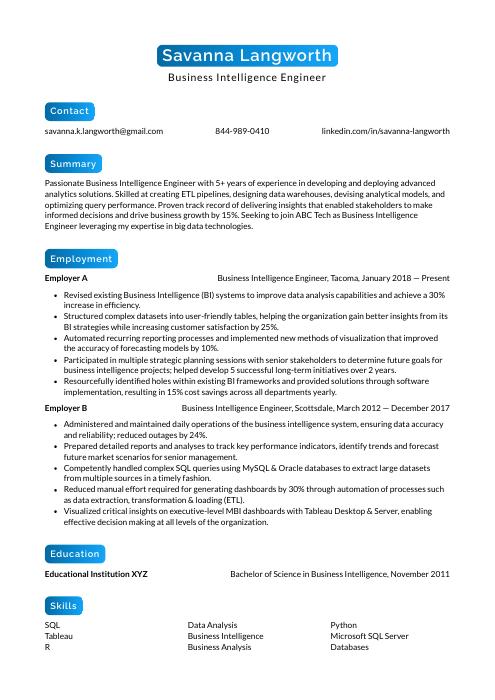 Kinkajou
Kinkajou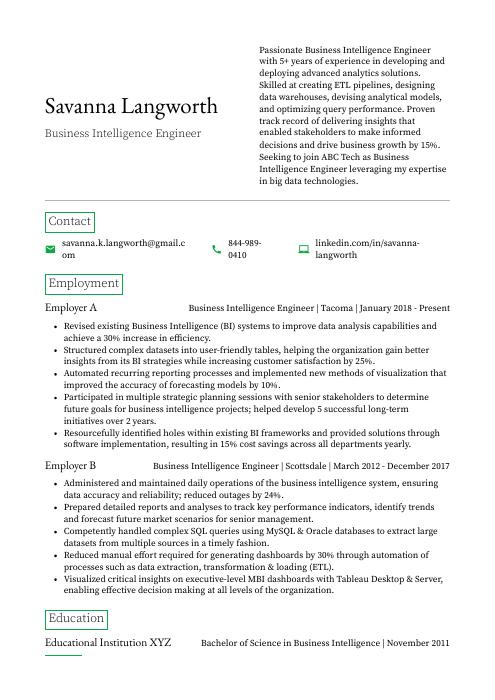 Quokka
Quokka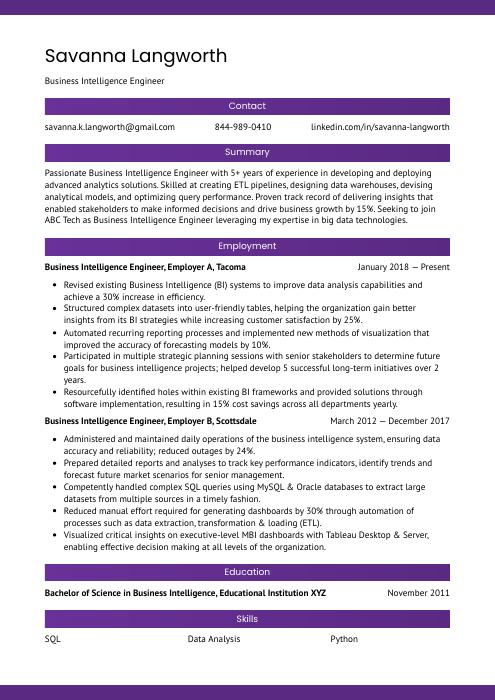 Jerboa
Jerboa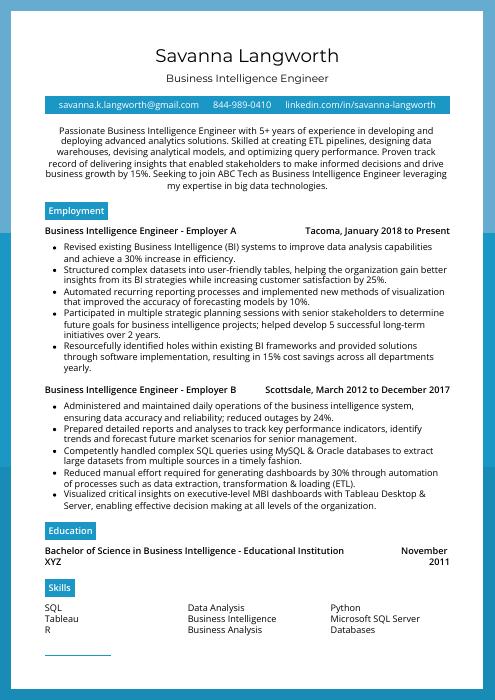 Rhea
Rhea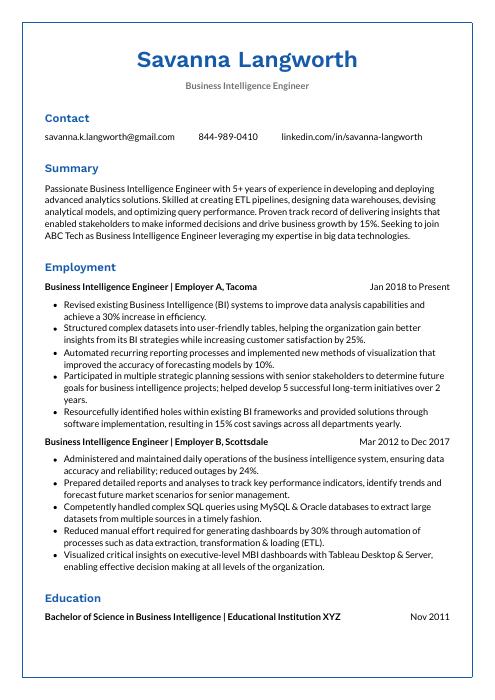 Markhor
Markhor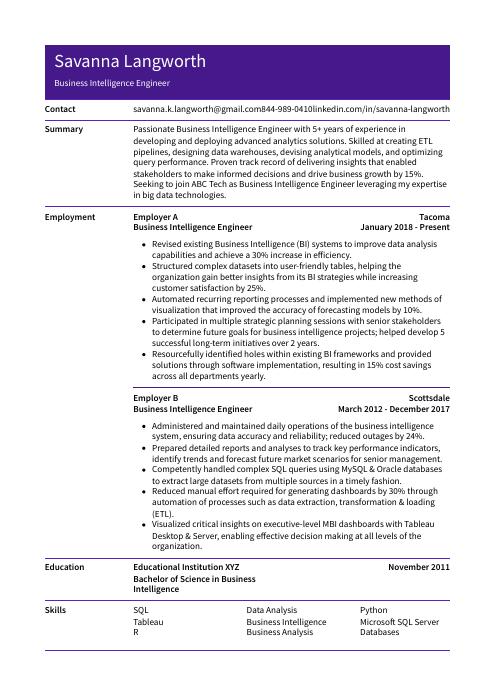 Pika
Pika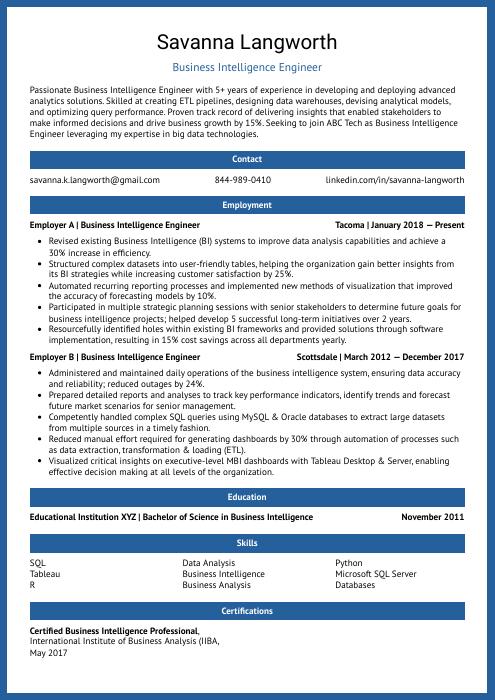 Ocelot
Ocelot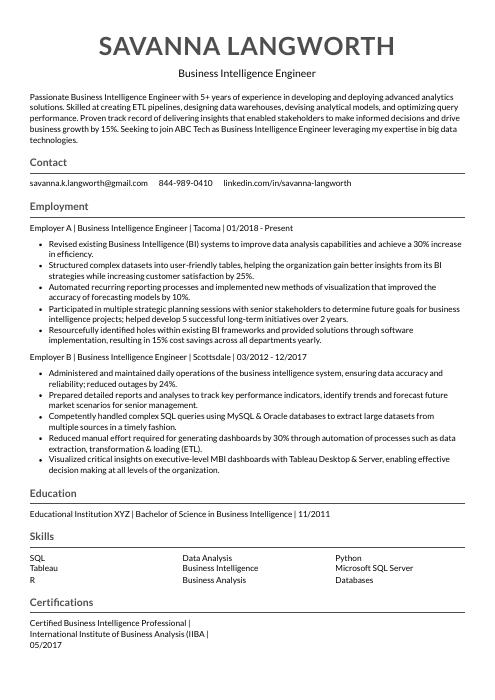 Indri
Indri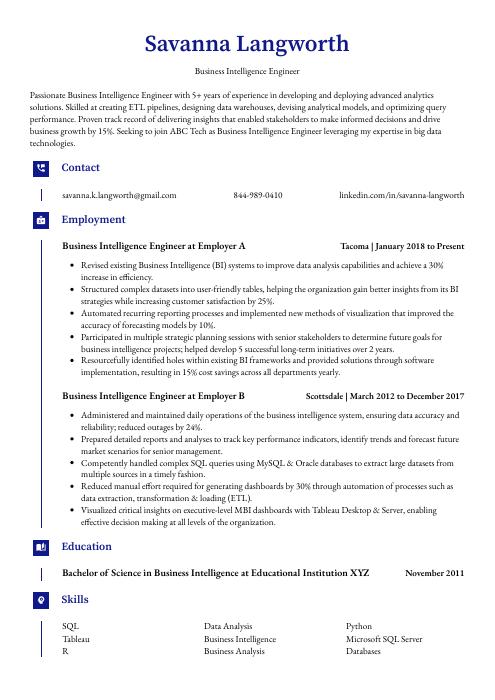 Gharial
Gharial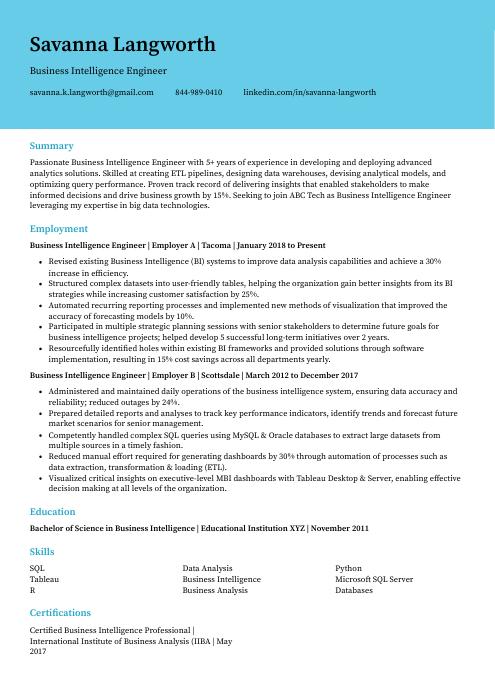 Dugong
Dugong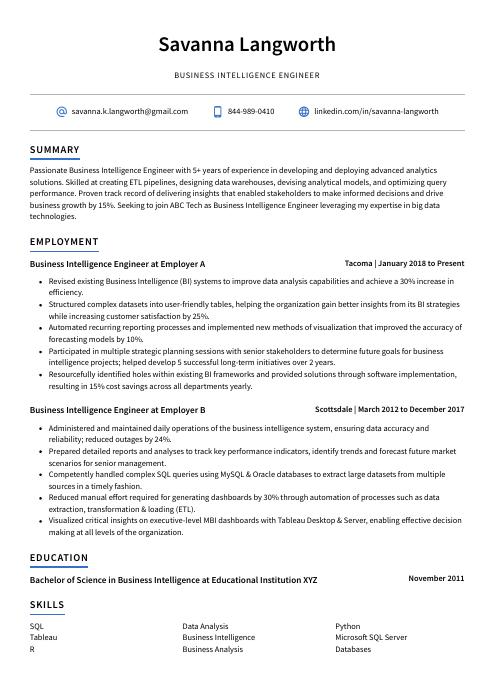 Axolotl
Axolotl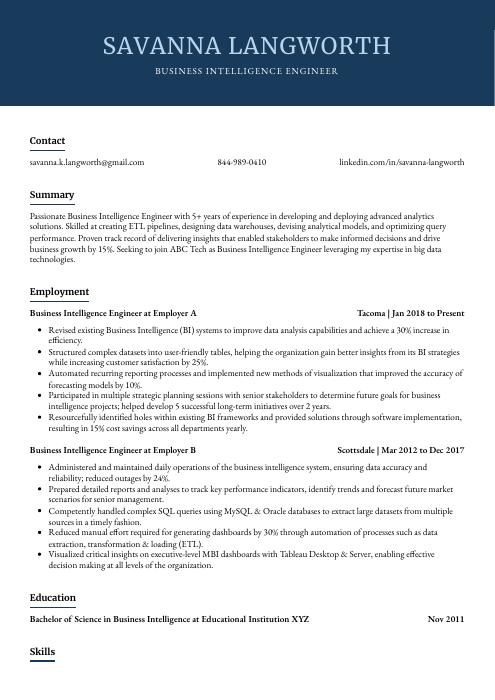 Bonobo
Bonobo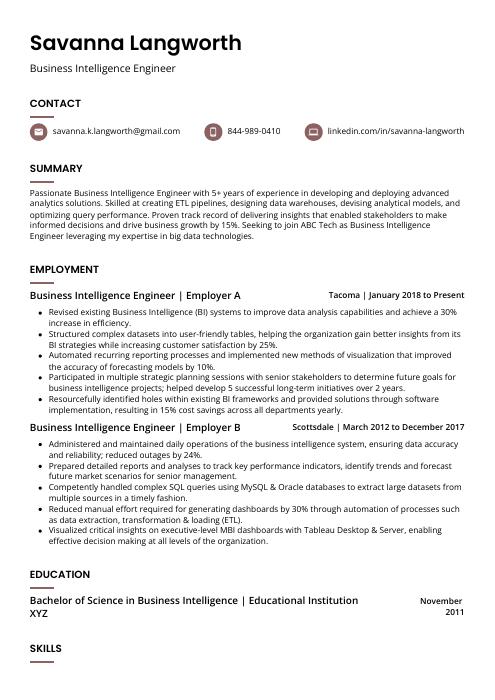 Fossa
Fossa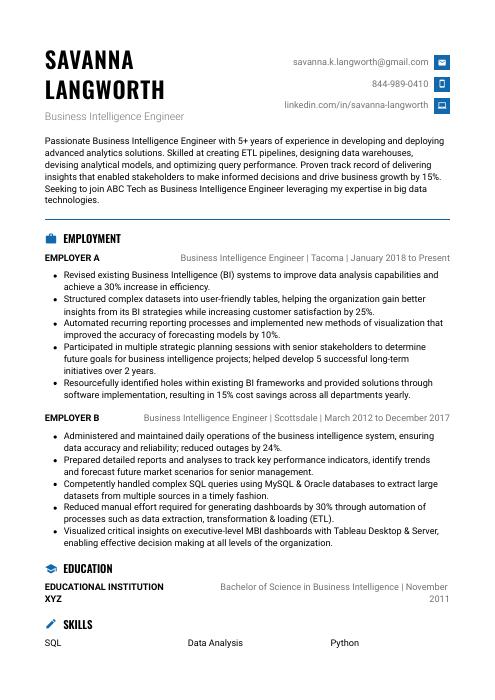 Echidna
Echidna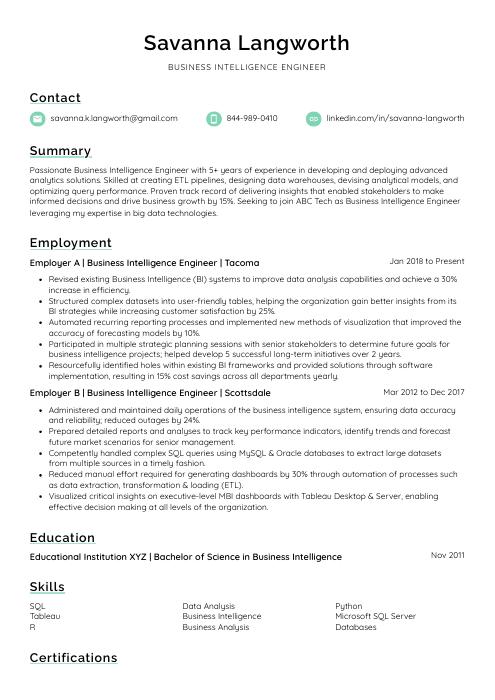 Lorikeet
Lorikeet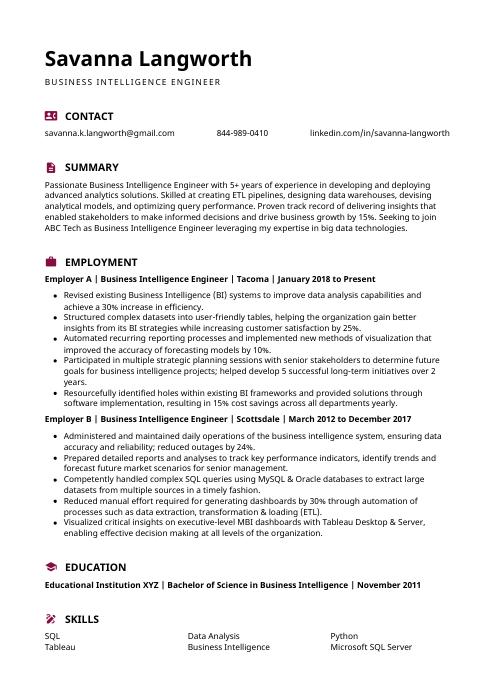 Hoopoe
Hoopoe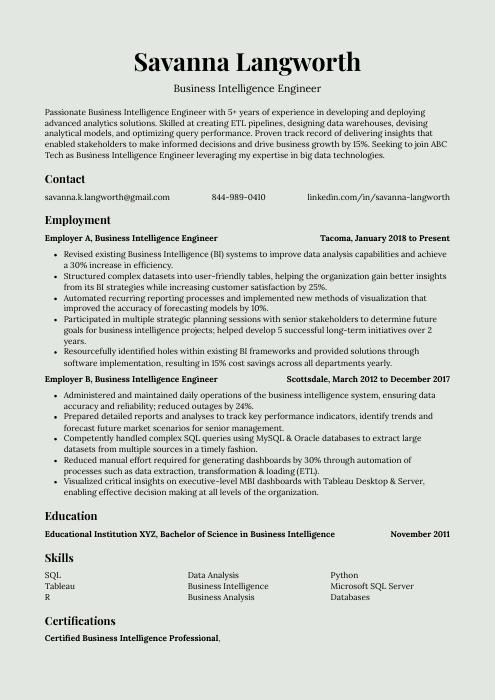 Saola
Saola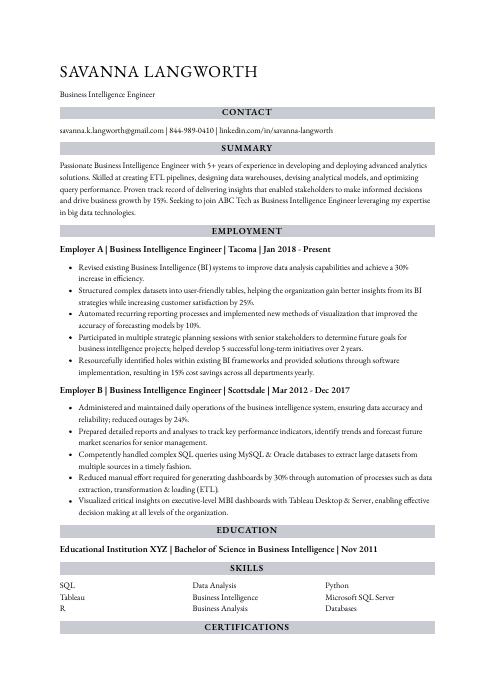 Numbat
Numbat Rezjumei
Rezjumei
